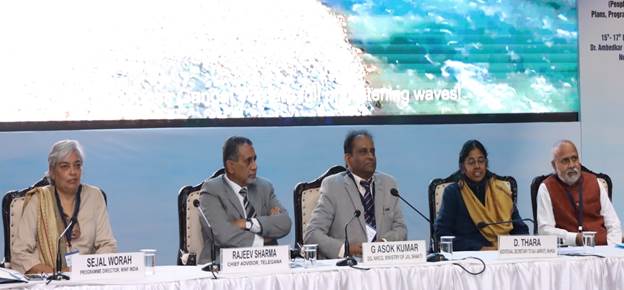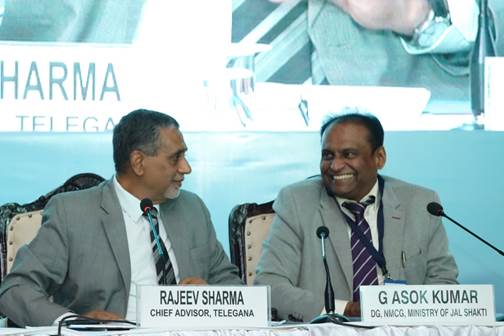Ministry of Jal Shakti
India Water Impact Summit: Day 2 Witnesses Wide Ranging Discussions On Restoration of Rivers & Conservation of Water
Posted On:
16 DEC 2022 8:26PM by PIB Delhi
Day 2 of the India Water Impact Summit (IWIS) being organised from 15th to 17th December at New Delhi witnessed wide ranging discussions today on various aspects of river conservation and restoration in particular and water sector in general. The Director General, National Mission for Clean Ganga (NMCG), Shri G. Asok Kumar presided over a session on ‘Lessons from Various River Related Programmes’. The session started with the invocation of the 5Ps which are essential towards river conservation and restoration efforts. Other panelists included Mr. D. Thara, Joint Secretary (AMRUT), Ministry of Housing and Urban Affairs, Dr. Sejal Worah, Program Director, WWF India, Prof. Vinod Tare, Founding Head cGanga, IIT Kanpur and Dr. Rajeev Sharma, Chief Advisor, Telangana. Other sessions on Day 2 included ‘Economics and Financing of Sludge’ co-chaired by Shri Himansu Badoni, Executive Director (Projects), NMCG and ‘Economics and Financing of Water Recycling and Water Trading Market’ co-chaired by Shri Bhaskar Dasgupta, Executive Director (Finance), NMCG. A session on ‘Establishing Present Condition and Norms for Bio-physical status of Healthy Rivers in Different Stretches from Origin to Destination, and setting the Milestones’ was also organised.
- DG, NMCG presides over session on ‘Lessons from Various River Related Programmes’
- A National Framework for River Systems (river, water bodies and catchment) proposed to be set up
- Detailed discussions held on Economic and Financing of Water Recycling and Sludge among other issues
- Deliberations show that for evaluation of the actual state and measuring the changes in the rivers and streams, the periodic assessment of their health is essential
- The focus of this Summit is to pave the way for mapping, integrating and assessing different scenarios/aspects of river health
Discussions on the 2nd day also deliberated on the economic, social, cultural, aesthetic and ecological values of rivers including the intrinsic values that are not dependent on people’s will. Deliberations showed that for evaluation of the actual state and measuring the changes in the rivers and streams, the periodic assessment of their health is essential. The focus of this Summit is to pave the way for mapping, integrating and assessing different scenarios/aspects of river health. It was proposed in the Session that there should be a National Framework for River Systems (river, water bodies and catchment), so that all the relevant programmes and projects working towards river and water conservation can benefit from the informed decision-making.
Addressing the gathering, Shri G. Asok Kumar talked about the ‘Catch the Rain’ campaign of the National Water Mission to emphasize on the significance of rainwater harvesting in rejuvenating the water bodies as the water stored in the flood banks help in restoring water and maintaining e-flow. He noted that water has no political and geographical boundary and emphasized the importance of river-people connect for the sustained development and economic growth of river rejuvenation sector. “People's participation is essential and there is a need to transform Jal Andolan into Jan Andolan,” he added.
Shri Kumar noted that there is an urgent need for the protection and rejuvenation of small rivers in India and acknowledged the important role being played through MGNREGA in reviving small rivers and creating water harvesting structures for sustenance. He said that a lot of good work is being done at district level in this direction and in the case of Namami Gange Programme, the active involvement of District Ganga Committees are manifesting in positive results in the Ganga Basin.
He noted that NMCG is working towards institutional building and urban river intervention plans. With the formation of the river-city alliance, river-centric planning is being given priority by the urban planners. He reiterated that evoking respect towards rivers, especially in the younger generation, will go a long way in protecting our water resources.
Mr. D. Thara, Joint Secretary (AMRUT) called for a need to understand the issue of water management from all perspectives and urged active involvement from various stakeholders in achieving success. Dr. Sejal Worah, Program Director, WWF India spoke on the importance of institutional mechanisms needed for rejuvenating small rivers. She noted that citizen engagement, creating a knowledge base that is open, transparent and shared, and deciding water tradeoffs are the crucial areas that needs to be looked into.
Prof. Vinod Tare focused on the significance of political will, public spending, partnership, participation of people, and perseverance to progress on this path and create impact towards effective water management. He noted that the Summit is bringing together individuals who are implementing major programs in the water sector. Dr. Rajeev Sharma, Chief Advisor, Telangana, noted that biodiversity in the rivers need to be looked into so as to improve the ecology of the water bodies.

DG, NMCG presides over session on ‘Lessons from Various River Related Programmes’

DG NMCG along with Chief Advisor, Telangana
******
AS
(Release ID: 1884302)
Visitor Counter : 1098
Read this release in:
Urdu